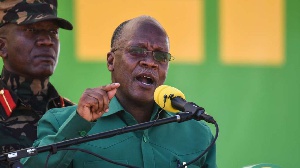 File Photo: Tanzania's President John Pombe Magufuli began his second term promising efficiency
File Photo: Tanzania's President John Pombe Magufuli began his second term promising efficiency
The Tanzania Investment Centre (TIC) will now be under the Office of the President to ensure efficiency, as President John Magufuli focuses on investment and regional co-operation in his second term. It was previously under the Office of the Prime Minister.
In his inaugural address to parliament in Dodoma on Friday, President Magufuli said his priorities are to attract foreign and local investments with a focus on industrial, agriculture, tourism, livestock and fishing development.
He vowed his fight against corruption to ensure integrity of government and that economic investments will be given full support under his administration.
“My government is going to dialogue with private sector investors to work out whatever hindrances are derailing investment in Tanzania,” he said.
In the past five years, the government had scrapped 168 hostile taxes and levies, 114 of them on agricultural production and 54 were imposed on trade and business.
FOCUS ON IRRIGATION
The president said 1.2 million hectares of land will be put under irrigation from the current 561,300 hectares to boost agricultural production and exports of horticulture and floriculture from current Tsh951 billion ($412 million) to Tsh1.8 trillion ($779 million) in the next five years.
He said his new government will seek to raise tourist arrivals from the current 1.5 million annually to five million, growing earnings from the current Tsh6.2 trillion ($2.6 billion) to Tsh14 trillion ($6 billion) by 2025.
This will be done through the establishment of wildlife ranches and hunting safaris as priority areas to attract more investments in tourism. Still on tourism, the government plans to buy five new aircraft, four for passenger service and one a cargo carrier.
Other areas targeted for development are transport and power supply, with a special focus on the supply of clean piped water from Lake Victoria to Central Tanzania at a cost of Tsh600 billion ($260 million).
On regional co-operation, President Magufuli said in the next five years he will focus on economic diplomacy, strengthening cooperation with the East African Community (EAC) and the Southern Africa Development Community (SADC) in business and economic development.
However, Tanzania’s traditional development partners including the US, Britain, the European Union, Norway, Sweden, Japan, Germany, Finland and South Korea did not send representatives to the president’s state of the union address.